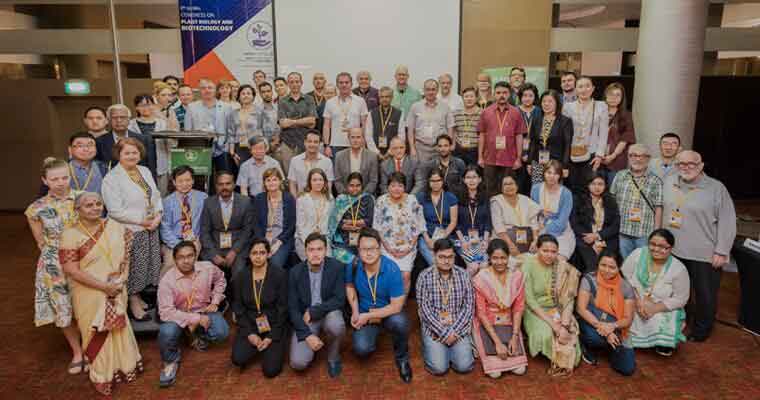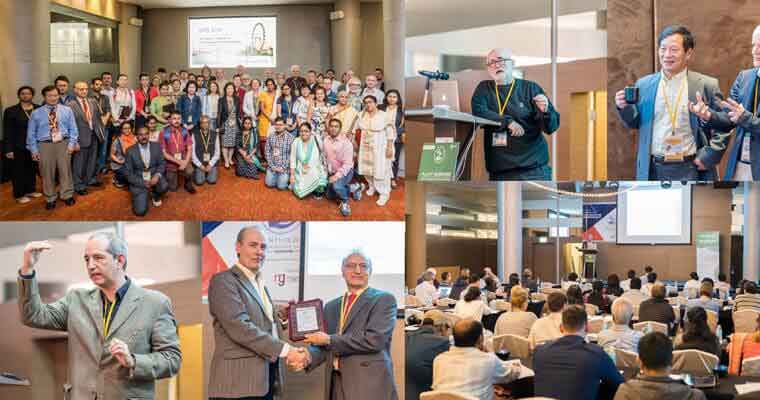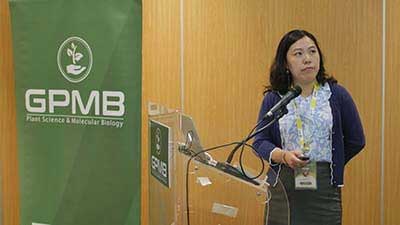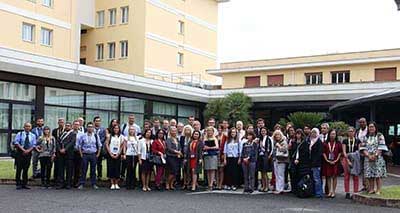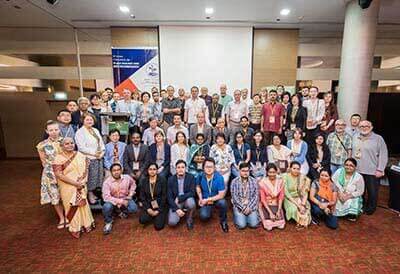About AGRI 2024 | HYBRID EVENT
Magnus Group is delighted to announce the "4th Edition of Global Conference on Agriculture and Horticulture (Agri 2024)”, scheduled to take place in Hybrid Mode. This global congress is set for September 16-18, 2024, in Rome, Italy.
With the theme "Evaluating Transformations in Agriculture & Horticulture: Efforts to Enhance Food Security" the three-day event provides participants the flexibility to engage either in-person in Rome or Virtually from their homes or workplaces.
Recognizing agriculture as a vital sector crucial for our survival, the conference will delve into the emerging trends that drive the sector's growth. These trends encompass advanced technologies and strategies, evolving over time to make farming more efficient and comfortable for farmers. The recent advancements not only contribute to the growth of agriculture but also improve the overall conditions for farmers.
The primary objective of the conference is to bring together a diverse group of professionals, including researchers, academicians, plant science experts, agriculturists, horticulturists, scientists, botanists, biotechnologists, and industrialists. The event aims to facilitate discussions on the latest research findings and case studies from around the world through concurrent sessions, fostering networking and collaboration opportunities.
Agri 2024 serves as a platform to explore the newest trends and challenges in the field of agriculture and horticulture. Participants can benefit from both in-person and online conference offerings, making it a crucial event for presenting cutting-edge research in agriculture, horticulture and related fields. The conference promotes interdisciplinary communication, bringing together scholars and practitioners from various scientific fields interested in enhancing agricultural approaches.
Agri 2024 presents a unique opportunity to engage in plenary talks, oral and poster presentations, workshops and seminars. Attendees can explore new opportunities in agricultural domains and associated sectors, making this conference a pivotal gathering in the advancement of agricultural practices.
Recommended Agriculture Conferences: Agriculture Conferences 2024 | Agriculture and Horticulture Conference | Agri 2024
SIGN UP FOR UPDATES
Get news, updates, and more from the Conference.
Scientific Committee Members

Dachang Zhang
Water & Eco Crisis Foundation, United States
Linas Balciauskas
Nature research centre, Lithuania
Nelida Lucia Del Mastro
Instituto de Pesquisas Energéticas e Nucleares, IPEN/CNEN, Brazil
V P S Arora
Venkateshwara Group of Institutions, IndiaOur Speakers

Gabrielle Elan Roesch McNally
American Farmland Trust, United States
Derek Scuffell
Knowmatics, United Kingdom
Dolores Valentina Mariscal Aguayo
Universidad Autónoma Chapingo, Mexico
Pia Ulvenblad
Halmstad University, Sweden
Shashi Vemuri
Professor Jayashankar Telangana State Agricultural University, India
Laura
Tecnalia, Spain
Henrik Barth
Halmstad University, Sweden
Marjana Zajc
Geological Survey of Slovenia, Slovenia
Heriberto Estrella Quintero
Universidad Autónoma Chapingo, Mexico
Ertugrul Yilmaz
Korkutelim Yem Food Industry Trade and Joint Stock Company, TurkeyAccreditation

Past Conference Information
Magnus Group is thrilled to announce that the “Joint Event On Plant Science And Agriculture” garnered a lot of attention on September 11-13, 2023 in Valencia, Spain.
The global congress was focused on the theme of "The Future of Plants and Plants for the Future" and it deliberated on the crucial aspects, latest trends, and challenges faced in the field of agriculture.
Renowned scientists, researchers, agriculturists, botanists, academicians, and industrialists from around the world participated in a three-day virtual event, presenting invited talks, keynote sessions, oral presentations, and e-poster presentations. The gathering covered a wide range of cutting-edge topics in the fields of Agriculture and Horticulture.
Agriculture Conferences 2024 | Agriculture and Horticulture Conference 2024 | Agri 2024 | Global Conference on Agriculture | International Conference on Agriculture and Horticulture | Horticulture Congress | Agriculture and Horticulture Events | Agriculture Meetings 2024 | Agriculture Conference | Horticulture Congress 2024 | Horticulture Conference 2024 | Agriculture Meeting | Agriculture Conference 2024 | Global Conference on Horticulture 2024
For AGRI 2023 Final Program: Click Here
For AGRI 2023 Abstract Book: Click Here
For AGRI 2023 Gallery: Click Here
DAY -01
Keynote Presentations
|
Dariusz Panka |
Bydgoszcz University of Science and Technology |
Poland |
|
Nelida Lucia Del Mastro |
Instituto de Pesquisas Energéticas e Nucleares, IPEN/CNEN |
Brazil |
Oral Presentations
|
Julia Shanks |
The Farmer's Office |
United States |
|
Alberto Acedo |
Biome Makers |
United States |
|
Aleksandar Radu |
University of Lincoln |
United Kingdom |
|
Juliana Lobo Paes |
Federal Rural University of Rio de Janeiro |
Brazil |
|
Dariusz Panka |
Bydgoszcz University of Science and Technology |
Poland |
|
Steve O Sullivan |
Caliper Content Services |
Ireland |
|
Rosa Rivieccio |
CREA |
Italy |
|
Harish B S |
University of Horticultural Sciences |
India |
|
Basavanagowda M G |
ICAR Taralabalu Krishi Vigyan Kendra |
India |
|
Erhan Akalp |
Dicle University Faculty of Agriculture Department |
Turkey |
|
Nelson Barau |
Pacifc Adventist University |
Papua New Guinea |
|
Layla S Tawfeek |
Cairo University |
Egypt |
|
Juliana Lobo Paes |
Federal Rural University of Rio de Janeiro |
Brazil |
|
Ernestina Valadez Moctezuma |
Universidad Autónoma Chapingo |
Mexico |
Poster Presentations
|
Madara Darguza |
Latvia University of Life Sciences and Technologies |
Latvia |
|
Victor Petcu |
National Agricultural Research and Development Institute |
Romania |
|
Jongtae Lee |
Gyeongsangnam-do Agricultural Research and Extension Services |
Korea, Republic of |
|
Changhee Son |
Gyeongsangnam-do Agricultural Research and Extension Services |
Korea, Republic of |
|
Eva Horvath |
University of Debrecen |
Hungary |
DAY-02
|
Qian Chen and Jianping Chen |
Chinese Academy of Agricultural Sciences (CAAS) |
China |
|
El-Hacene Balla |
University of Bejaia |
Algeria |
|
Sihle Pokwana |
Rhodes University |
South Africa |
|
Happy Bango |
University of Limpopo |
South Africa |
|
Regina Menino |
National Institute for Agrarian and Veterinarian Research |
Portugal |
|
Aleksandar Radu |
University of Lincoln |
United Kingdom |
Oral Presentations
Agriculture Conferences 2024 | Agriculture and Horticulture Conference 2024 | Agri 2024 | Global Conference on Agriculture | International Conference on Agriculture and Horticulture | Horticulture Congress | Agriculture and Horticulture Events | Agriculture Meetings 2024 | Agriculture Conference | Horticulture Congress 2024 | Horticulture Conference 2024 | Agriculture Meeting | Agriculture Conference 2024 | Global Conference on Horticulture 2024
Oral Presentations Virtual
|
Xiujing Xing |
Provivi, Inc, |
United States |
|
Andrew Littell |
Carnegie Mellon University |
United States |
|
Charith Raj Adkar Purushothama |
Université of Sherbrooke |
Canada |
|
Jose Maria Alvarez de la Puente |
The Ohio State University |
United States |
|
Pete W. Jacoby |
Washington State University |
United States |
|
Odunayo James Rotowa |
University of Agriculture |
Poland |
|
Hajer Mohamed Ibrahim |
University Of Debrecen |
Hungary |
DAY-03
Keynote Presentations
|
Shashi Vemuri |
Professor Jayashankar Telangana State Agricultural University |
India |
|
Sarker Mohammad Rezaul Karim |
Univesiti Putra Malaysia |
Malaysia |
|
J. C. Tarafdar |
Indian Agricultural Research Institute |
India |
|
Linas Balčiauskas |
Nature Research Centre |
Lithuania |
|
V. P. S. Arora |
Professor Emeritus, Sharda University |
India |
|
Dachang Zhang |
Water & Eco Crisis Foundation |
United States |
Poster Presentations
|
Krittaya Petchpoung |
Kasetsart University |
Thailand |
|
Larisa Caisin |
Technical University of Moldova, |
Moldova, Republic of |
Oral Presentations
|
Gun Mardiatmoko |
Pattimura University |
Indonesia |
|
Nkosomzi Sipango |
North West University |
South Africa |
|
Onke Hawu |
North West University |
South Africa |
|
Subhas Chandra Datta |
Kanchannagar D. N. Das High School (HS) |
India |
|
Lior Rubinovich |
Migal-Northern Agriculture R&D |
Israel |
|
Augusta Costa |
Instituto Nacional de Investigação Agrária e Veterinária |
Portugal |
|
Koffi Christophe Kobenan |
National Centre of Agronomic Research |
Cote d'Ivoire |
|
Bagavathi Ammal |
Pajancoa & Ri |
India |
|
Abu Zar Ghafoor |
Warsaw University of Life Sciences |
Poland |
|
C Ravindran |
Tamil Nadu Agricultural University |
India |
|
Sire Diedhiou |
Universite Assane Seck Ziguinchor |
Senegal |
|
Senaka Lalith Dharmasri Amarathunga |
Uva Wellassa University |
Sri Lanka |
|
Shumaila Shahid |
Indian Agricultural Research Institute |
India |
|
Vir Singh |
GB Pant University of Agriculture and Technology |
India |
|
Sreeni K R |
Sarvathobhadram Organic-Farmers |
India |
|
Laura Martins de Carvalho |
Campinas State University (UNICAMP) |
Brazil |
|
Upma Sharma |
Maharana Pratap University Of Agriculture And Technology |
India |
|
Valasia Iakovoglou |
UNESCO |
Greece |
Agriculture Conferences 2024 | Agriculture and Horticulture Conference 2024 | Agri 2024 | Global Conference on Agriculture | International Conference on Agriculture and Horticulture | Horticulture Congress | Agriculture and Horticulture Events | Agriculture Meetings 2024 | Agriculture Conference | Horticulture Congress 2024 | Horticulture Conference 2024 | Agriculture Meeting | Agriculture Conference 2024 | Global Conference on Horticulture 2024
Upcoming Plant Conferences:
Conference Name: 8th Edition of Global Congress on Plant Biology and Biotechnology
Dates: March 25-27, 2024
Venue: Singapore
Conference Name: 9th Edition of Global Conference on Plant Science and Molecular Biology
Dates: September 16-18, 2024
Venue: Rome, Italy
Upcoming Aquaculture Conferences:
Conference Name: 4th Edition of World Aquaculture and Fisheries Conference
Dates: June 24-26, 2024
Venue: Paris, France
Upcoming Traditional Medicine Conferences:
Conference Name: 6th Edition of International Conference on Traditional Medicine, Ethnomedicine and Natural Therapies
Dates: June 20-22, 2024
Venue: Paris, France
Conference Name: 7th Edition of International Conference on Traditional Medicine, Ethnomedicine and Natural Therapies
Dates: September 5-7, 2024
Venue: Madrid, Spain
Upcoming Agriculture Conferences:
Conference Name: 4th Edition of Global Conference on Agriculture and Horticulture
Dates: September 16-18, 2024
Venue: Rome, Italy
Upcoming Food Science Conferences:
Conference Name: 6th Edition of Euro-Global Conference on Food Science and Technology
Dates: September 16-18, 2024
Venue: Rome, Italy
Upcoming Nutrition Conferences:
Conference Name: 6th Edition of International Nutrition Research Conference
Dates: September 16-18, 2024
Venue: Rome, Italy
For Magnus Group Conferences Reviews:
Magnus Group Agriculture Conferences Reviews | Magnus Conferences Reviews
|
8th Edition of Global Congress on Plant Biology and Biotechnology (GPB 2024) |
March 25-27, 2024 |
|
|
9th Edition of Global Conference on Plant Science and Molecular Biology (GPMB 2024) |
September 16 – 18, 2024 |
|
|
4th Edition of Global Conference on Agriculture and Horticulture (AGRI 2024) |
September 16 – 18, 2024 |
Magnus Group is thrilled to announce that the “2nd Edition of Global Conference on Agriculture and Horticulture” garnered a lot of attention during September 01 to 03, 2022.
The global congress was focused on the theme of "Rethinking Paradigm Shift in Agriculture and Initiatives to Enhance Food Security "and it deliberated on the crucial aspects, latest trends and challenges faced in the field of agriculture.
Agriculture Conferences 2024 | Agriculture and Horticulture Conference 2024 | Agri 2024 | Global Conference on Agriculture | International Conference on Agriculture and Horticulture | Horticulture Congress | Agriculture and Horticulture Events | Agriculture Meetings 2024 | Agriculture Conference | Horticulture Congress 2024 | Horticulture Conference 2024 | Agriculture Meeting | Agriculture Conference 2024 | Global Conference on Horticulture 2024
DAY -01
Keynote Presentations
| Linas Balciauskas | Nature Research Centre | Lithuania |
| Vasudeva Singh | Gauhati University | India |
| Valasia Iakovoglou | UNESCO chair Con-E-Ect | Greece |
| Dachang Zhang | Water & Eco Crisis Foundation, San Jose | United States |
Oral Presentations
| Sumudu Senanayake | University of Technology Sydney | Australia |
| Sarvin Elahi | University of Technology Sydney | Australia |
| Gun Mardiatmoko | Pattimura University | Indonesia |
| Thi Kieu Oanh Nguyen | Metrolink Co. Ltd | Vietnam |
| Peter Stevenson | Compassion in World Farming International | United Kingdom |
| Ana Salvatierra Rojas | Solar Cooling Engineering UG | Germany |
| Alessandro Magrini | University of Florence | Italy |
| Abdul Khalil Gardezi | Agricultural Science Texcoco | Mexico |
| Mark De Santis | CEO, Bloomfield Robotics | United States |
| Shiv Vendra Singh | Graphic Era Hill University | India |
| Safiul Islam Afrad | Bangabandhu Sheikh Mujibur Rahman Agricultural University | Bangladesh |
Poster Presentations
| D J Patel | Anand Agricultural University | India |
| Nircia Isabella Andrade Pereira | Federal University of Vicosa | Brazil |
| Barbara Sawicka | University of Life Science in Lublin | Poland |
| Gunay Talibova | Baku State University | Azerbaijan |
DAY-02
Keynote Presentations
| Maximilian Lackner | Lackner Ventures and Consulting GmbH | Austria |
| S M Rezaul Karim | Universiti Putra Malaysia | Malaysia |
| Vijayan Gurumurthy Iyer | Techno-Economic-Environmental Study and Check Consultancy Services | India |
| Shashi Vemuri | University Head of Entomology at PJTSAU | India |
Agriculture Conferences 2024 | Agriculture and Horticulture Conference 2024 | Agri 2024 | Global Conference on Agriculture | International Conference on Agriculture and Horticulture | Horticulture Congress | Agriculture and Horticulture Events | Agriculture Meetings 2024 | Agriculture Conference | Horticulture Congress 2024 | Horticulture Conference 2024 | Agriculture Meeting | Agriculture Conference 2024 | Global Conference on Horticulture 2024
Oral Presentations
| Bimal Kumar Ghimire | Konkuk University | Korea, Republic of |
| Alicja Niewiadomska | Poznan University of Life Science | Poland |
| Antonio Berardi | University of Bari Aldo Moro | Italy |
| Jarkko Leppala | Natural Resources Institute Finland (Luke) | Finland |
| Solomon Newete | Agricultural Research Council | South Africa |
| Enobong Akpan Etuk | University of Bolton | United Kingdom |
| Cornelis Heemskerk | Inholland University of Applied Science | Netherlands |
| Inga Muizniece | Latvia University of Life Sciences and Technologies | Latvia |
| Pello Alfonso Muniozguren | Fundación Sustalde | Spain |
| Gideon Danso Abbeam | University of the Free State | South Africa |
| Elias Militao | Mid Sweden University | Sweden |
| Rajesh Mehrotra | Birla Institute of Technology and Science | India |
| Poonam Malakondaiah | Govt. of Andhra Pradesh | India |
DAY-03
Keynote Presentations
| Olivier Sparagano | City University of Hong Kong | Hong Kong |
| J C Tarafdar | Indian Agricultural Research Institute | India |
| Soumen Bhattacharjee | University of Burdwan | India |
| Krishan Kant Tyagi | ICAR-Indian Agricultural Statistics Research Institute | India |
Oral Presentations
| Zohreh Nasimi | Sichuan Agricultural University | China |
| Bartlomiej Glina | University of Life Sciences | Poland |
| Lucrecia Valentine | Cape Peninsula University of Technology | South Africa |
| Volodymyr Starodubtsev | National University of Life and Environmental Sciences of Ukraine | Ukraine |
| Pawan Kumar Sharma | Sher-e-Kashmir University of Agricultural Sciences & Technology | India |
| K N Gupta | Jawaharlal Nehru Krishi Vishwa Vidyalaya | India |
| Nabil Sabet A Mustafa | National Research Centre | Egypt |
| Subhas Chandra Dattaa | VisvaBharati University | India |
| Murari Lal Gaur | Anand Agricultural University | India |
| Umair Ashraf | University of Education, Lahore | Pakistan |
| Parthasarathi Theivasigamani | Vellore Institute of Technology | India |
| Muhammad Awais Rafiq | Citiscape- Horticulture & Landscape | United Arab Emirates |
Agriculture Conferences 2024 | Agriculture and Horticulture Conference 2024 | Agri 2024 | Global Conference on Agriculture | International Conference on Agriculture and Horticulture | Horticulture Congress | Agriculture and Horticulture Events | Agriculture Meetings 2024 | Agriculture Conference | Horticulture Congress 2024 | Horticulture Conference 2024 | Agriculture Meeting | Agriculture Conference 2024 | Global Conference on Horticulture 2024
For Magnus Group Conferences Reviews:
Magnus Group Agriculture Conferences Reviews | Magnus Conferences Reviews
Magnus Group is thrilled to announce that the “1st Edition of Global Conference on Agriculture and Horticulture” garnered a lot of attention during September 30 to October 2, 2021.
The global congress was focused on the theme “To Accomplish over the Global Challenges of Agriculture” and it deliberated on the crucial aspects, latest trends and challenges faced in the field of agriculture.
Invited talks, keynote session oral presentations and e-poster presentations by eminent and leading scientists, researchers, agriculturists, botanists, academicians and industrialists from all corners of the globe contributed in the three-day virtual gathering encompassing all frontier topics in the field of Agriculture and Horticulture.
Agriculture Conferences 2024 | Agriculture and Horticulture Conference 2024 | Agri 2024 | Global Conference on Agriculture | International Conference on Agriculture and Horticulture | Horticulture Congress | Agriculture and Horticulture Events | Agriculture Meetings 2024 | Agriculture Conference | Horticulture Congress 2024 | Horticulture Conference 2024 | Agriculture Meeting | Agriculture Conference 2024 | Global Conference on Horticulture 2024
Keynote Speakers
| Weicheng Wu | East China University of Technology | China |
| Dachang Zhang, | Water & Eco Crisis Foundation, San Jose, California | USA |
| V P S Arora | Sharda University | India |
Oral Speakers
| Karine Chenu | The University of Queensland | Australia |
| Laura Martins de Carvalho | FGV-SP | Brazil |
| Danilo Jose Fanelli Luchiari | Citrus Technical Assistance And Consulting Group | Brazil |
| Ghulam Zakir Hassan | Charles Sturt University | Australia |
| Masuda Akter | Bangladesh Rice Research Institute, | Bangladesh |
| Sellamuthu Prabakaran | Pontificia Universidad Javeriana Cali | Colombia |
Agriculture Conferences 2024 | Agriculture and Horticulture Conference 2024 | Agri 2024 | Global Conference on Agriculture | International Conference on Agriculture and Horticulture | Horticulture Congress | Agriculture and Horticulture Events | Agriculture Meetings 2024 | Agriculture Conference | Horticulture Congress 2024 | Horticulture Conference 2024 | Agriculture Meeting | Agriculture Conference 2024 | Global Conference on Horticulture 2024
Posters Speakers
| Hua Bai | Northwest Missouri State University | United States |
| Christina Cox | Aberystwyth University | United Kingdom |
| Yolander Renea Youngblood | Prairie View A&M University | United States |
We thank all our participants for joinng and making the event sucessfull and we look forward to welcome you at our upcoming events.
Agriculture Conferences 2024 | Agriculture and Horticulture Conference 2024 | Agri 2024 | Global Conference on Agriculture | International Conference on Agriculture and Horticulture | Horticulture Congress | Agriculture and Horticulture Events | Agriculture Meetings 2024 | Agriculture Conference | Horticulture Congress 2024 | Horticulture Conference 2024 | Agriculture Meeting | Agriculture Conference 2024 | Global Conference on Horticulture 2024
For Magnus Group Conferences Reviews:
Magnus Group Agriculture Conferences Reviews | Magnus Conferences Reviews
Conference Schedule
Opening Ceremony and Introduction
Keynote Session I
Refreshment Break
Keynote Session II
Lunch
Break Out Session I
Refreshment Break
Break Out Session II
Keynote Session III
Refreshment Break
Break Out Session III
Lunch
Poster Presentations
Refreshment Break
Break Out Session IV
Keynote Session IV
Refreshment Break
Break Out Session V
Lunch
Break Out Session VI
End Note Session and Closing Ceremony
Get in Touch Make Inquiry
Please feel free to contact us for any information, all the queries will be answered by the conference secretariat within 24 hrs.
Photo Gallery (Our Past Events)
Testimonials

It was well attended with very timely presentation. Once again, this was one of the best organized international conferences I have ever had.
Mohammad Babadoost University of Illinois, USA
I found the conference well-organized with a good diversity of papers and posters from around the world. An excellent opportunity to learn!
Cornelia Butler Flora Kansas State University, USA
Thank you for having given me the opportunity as a key note speaker in plant biology and biotechnology conference. The conference was very well arranged.
Sankaranarayanan Sadasivam Tamil Nadu Agricultural University, India
It is a very challenging and well organized meeting, good to have attendees from all over the world.
Monica Ruffini Castiglione University of Pisa, Italy
I want to thank for the tremendous work on the organization of the forum and the success of the event. Impressions are the most positive. I hope for further meetings and wish you all good luck.
Sergey.A. Kornatskiy Peoples’ Friendship University of Russia (RUDN University), Russia
The event has been a splendid one. Well done to the organizing committee
Ahmad Radhzlan Rosli FGV R&D Sdn. Bhd., Malaysia
It was fruitful meeting and there were many interesting presentations from the field of plant science and biotechnology
Jiri Sedlak Research and Breeding Institute of Pomology Holovousy Ltd, Czech Republic
Thank you very much for such a wonderful Congress! I was very glad to spend these wonderful days with you. I hope to see you soon.
Oksana Lastochkina Bashkir Research Institute of Agriculture, Russia
The meeting is very interesting. The complete view is towards different aspects of the plant science and it’s a fruitful meeting for all the participants.
Antonio Domenech-Carbo University of Valencia, Spain
The conference is very good and scientists from many countries attended. We all enjoyed the conference very much.
Samir C. Debnath St. John’s Research and Development Centre, Canada
One of the most interesting conferences, having a huge number of presenters.
Elena Rakosy-Tican Babes-Bolyai University, Romania
